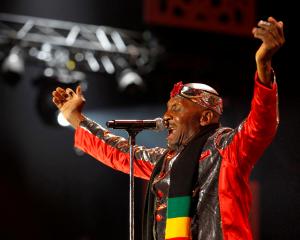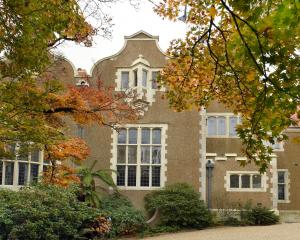''You can only take so much flattery about who you used to be,'' Dennis Locorriere, founding member of Dr Hook and the Medicine Show, says.
''It's like going up to an attractive older person and saying, 'Wow, I remember you when you were gorgeous', and not expecting to get a smack in the mouth.''
Scheduled to tour New Zealand next month, including a show at the Regent Theatre, Dunedin, on May 8, Locorriere is on the line from England, explaining both his long-held reluctance to revisit his former band's back catalogue and the reasons why he no longer finds those trips down memory lane so difficult.
''When the band split up in 1985 I did some acting, wrote songs for other people ... it was time to take a little look around. That's because I think there's something dangerous about allowing yourself to be congratulated for something you did years ago, over and over again.
''I don't want to sound too silly saying this but, from resisting the music a little bit, I now almost feel like it's my duty to represent these songs.''
And it's quite a list of songs, too: from Sylvia's Mother, Cover Of The Rolling Stone, Sharing the Night Together, When You're in Love With A Beautiful Woman, Sexy Eyes, Baby Makes Her Blue Jeans Talk, Walk Right In to a rendition of Sam Cooke's Only Sixteen, several of the group's singles reached the United States and United Kingdom top 10s as well as charting elsewhere in the world.
''For the past 10 or 12 years I've travelled around with two or three guitars and 40 years worth of songs. I sang Dr Hook hits as well as my solo stuff,'' Locorriere says.
''I wanted to go back to how I started before I met the band, which was as a singer-songwriter.''
He might have been to New Zealand several times before, both with Dr Hook and as a solo artist, but Locorriere says he has been away long enough ''to be anxious'' about his forthcoming tour.
''It's like visiting an old friend you haven't seen for a long time, being on the train and wondering, `Gee, I hope we still like each other'.
''I'm bringing something I think people are going to like. I'm not presenting the original band; I mean four of them have passed away. I'm not trying to trick people into thinking this is a band reunion, but this is the music of Dr Hook.
''Luckily, for me, a lot of the songs stand up.''
Last year, Universal Music (which acquired Dr Hook's back catalogue following its purchase of EMI) contacted Locorriere, the idea being to release an album that mixed a retrospective approach with new songs.
The result was Timeless, a double album comprising 40 tracks.
''It got me listening to the body of work again. I hadn't done that before. I did some promotion when it came out ... and I started to realise the songs were important to people at a certain level.
''People come up to me and start talking. And it's never along the lines of, 'Hi Dennis, my name is ...'. It's typically along the lines of, 'Dennis, when my dad and I used to go camping, we used to sing Dr Hook songs all the way there; he passed away and we played one of your songs at his funeral ...'
''I realised I'd been in a relationship with someone I hadn't met. You have to pay attention to that, even though I don't go around wondering who recognises me.''
• Dr Hook and the Medicine Show formed in Union City, New Jersey, in 1977 when singer-songwriter Locorriere met Ray Sawyer (who had lost an eye following a 1967 car crash and chose to wear a patch.)
The duo shared lead vocals, teamed up with a few of Sawyer's former Chocolate Papers band-mates and, concentrating on country music, Dr Hook and the Medicine Show began playing some of the roughest bars in the New Jersey area.
The group got a major break in 1970 when it performed on the soundtrack to the Dustin Hoffman film Who Is Harry Kellerman (and why is he saying those terrible things about me?).
The songs on that soundtrack were penned by Shel Silverstein, a Playboy magazine cartoonist and children's author, who was recruited into the band and became a catalyst for its early success.
Silverstein, who had written A Boy Named Sue for Johnny Cash and The Unicorn for the Irish Rovers, also penned the group's first single, Sylvia's Mother, a parody of teen-heartbreak that, despite flopping on the release in 1971 of the band's self-titled debut album, reached the US top 10 the following year.
That success was promptly followed by Cover Of The Rolling Stone, in which the band expressed a desire to feature on the prominent magazine (a wish it was granted).
''We used to be a bar band in New Jersey, where I was from,'' Locorriere recalls.
''We got some lucky breaks and travelled the world. We couldn't believe we were an international success.
''When you play in bars you have to play any kind of music that prevents you from being killed. If someone comes up and asks if you know any country music, you say, `Yes sir, we do now'. It keeps you flexible.
''When we were an international concern, the irony was we'd gone from being a bar band to the world stage.
''No matter if we were singing a heart-wrenching ballad or some corny song like Cover of the Rolling Stone, it was always with the attitude of `Can you believe this?','' Locorriere laughs.
In fact, self-effacing humour helped keep the band together for a long time.
(The group officially disbanded in 1985 following the departure of Sawyer two years earlier.)
''I always knew that if I stepped out of line there would be other guys who would push me up against the wall and say, 'What do you think you're doing?'.
"We were all like that. No-one was going to mess up too badly; no-one was going to carry drugs over a border. No-one missed a plane,'' Locorriere says.
''We always felt responsible for one another because we were friends. We had so much fun, mostly on stage, to tell the truth.
''That's not to say we didn't have fun off the stage ...''
The shows
Dennis Locorriere (and band) presents the songs of Dr Hook at the following venues in the South:
• Theatre Royal, Timaru, May 7
• Regent Theatre, Dunedin, May 8
• Civic Theatre, Invercargill, May 9












